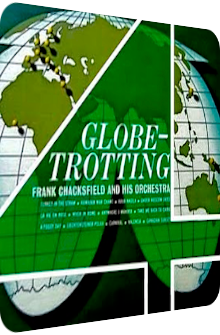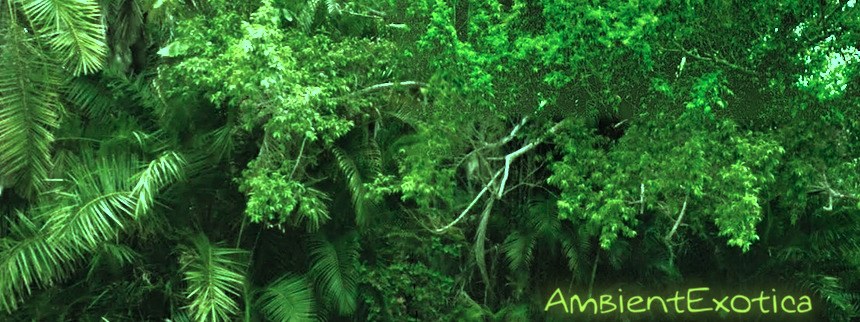
Frank Chacksfield
Globetrotting
1965
Conductor and arranger Frank Chacksfield (1914–1995) is the man for an all-encompassing genre-spanning variety which comes with a lot of hit-or-miss affairs, naturally. However, his material of the 60’s sees a man at his peak, content to make the right choices both in curation and arrangements. The ten-track album Globetrotting, released in 1965 on Decca as part of their Phase4Stereo series for audiophile connoisseurs, is no different in this regard. Spanning an equal amount of countries plus two medleys, Chacksfield may neglect the truly faraway, Asian countries – which he presented prior on his LP In The Mystic East (1957) – in order to focus on a trip to Old Europe and its peripheries, but otherwise enchants with a superb balance of strings, horns and woodwind instruments.
Sure, you hear these devices on every symphonic album, as they make up the bare minimum of instruments that are widely adhered to the concept of orchestras, but here the way they are played is most enthralling. In fact, the scintillating allure is so big that even questionable segues or potentially dull moments suddenly turn into something great. Add rhythm shifts, astonishing transformations and other advantages such as harps, balalaikas, zithers, steel guitars and pompous drums to the scenery, and you are ready to go. Here is a closer look at a work that is easily available but not well known, be it due to the flood of Frank Chacksfield’s own works or the admittedly slightly tiresome amount of travelogs. But whatever, there’s enough space on AmbientExotica for yet another in-depth review… I've checked with the site owner, so all is well.
Starting with the world-famous violin riff of Turkey In The Straw, Frank Chacksfield’s orchestra does not waste any time and brings the listener into the right mood. While not exotic per se, the oft-cited Space-Age vibe is definitely apparent. One of Turkey’s most traditional songs encounters rhythm shifts, clinging percussion and a gorgeous mélange of strings, woodwinds and horns complete with harp helixes; rarely is an arrangement so well-balanced, shuttles between warped nights, show tune cataracts and gypsy-evoking lead fiddles, with the next stop being Israel, where one of two medleys is presented. Anywhere I Wander launches with rolling timpani storms and is soon transformed into a cinematic string steppe, eventually making room for the mandatory inclusion of Hava Nagila which ends the medley with a fusillade of staccato horns and strings. Torn between Latin and Oriental flavors, it turns out to be a great – though not surprising – inclusion in Frank Chacksfield’s Globetrotting adventure.
There is hardly ever an Easy Listening travelog album that does not succumb to the amorous stereotypical magic of France, let alone Mack David’s and Marcel Louiguy’s La Vie En Rose. And indeed, Édith Piaf’s smash hit is harbored by the LP as well. Expect particularly lavender-colored strings and an unexpectedly reverberated and thus oneiric use of the accordion. The textures themselves are hence surprisingly good and uplifting; the tone sequences of smooch and romance, however, are definitely not everyone’s glass of wine, and the dreaminess is almost embarrassingly chintzy. But again, the arrangement itself is gorgeous even to the technocratic cold-hearted stereophile.
Under Moscow Skies follows, and yes, this traditional piece is as grave and majestic as one imagines. Solemn string cloudlets and aqueous harp particles meet sunset-lit balalaika licks, and once the apex of the track is reached, so is the bucolic tunnel vision as the composition shortly increases the tempo. This tune is farther away from both the Space-Age pericarp and the paradisiac Polynesian isles, but so be it. At least the latter is rectified with the following Hapa Haole classic, Hawaiian War Chant by Prince Leleiohoku, as usual based here on the famous transcription by Johnny Noble. And this version is a blast! Alright, there’s a steel guitar on board, fine. But what makes this a real corker apart from the inclusion of stunning drum solos, textures and patterns is the metamorphosis into a brass-heavy high-rise monolith of tachycardia proportions. Smoking-fast rhythms, gleaming horns, euphony aplenty, this is actually a very great interpretation and a first-class way to end side A.
Side B kicks off with a trip to Spain, epitomized by José Padilla’s Valencia which – you’ve already guessed it – is supercharged with Flamenco guitars, scything horns and the ligneous clacketyclack of castanets. A more symphonic counterpoint is made by the whirling strings and occasional harp glissando. The galloping rhythm rounds off a very festive sparkler that is not unlike Hawaiian War Chant, but carried by a greater pride. Meanwhile in London: with George & Ira Gershwin’s A Foggy Day, Frank Chacksfield tries to unite the golden thread of a show tune with a piano-underlined pub atmosphere and a symphonic undercurrent. The dreamy first phase of the tune meets Crime Jazz horns later on, although the mood remains exclusively soothing and insouciant.
Whereas Lindt Kotscher’s and Joseph Seener’s Liechtensteiner Polka dishes up some Germanized oompa schmutz complete with the expected brass kitsch, the adjacent Carnival is unexpectedly doleful in its first moment before it ventures into cautiously upbeat material. But carnivalesque or jolly it is not. Carolyn Leigh’s and Cy Coleman’s When In Rome is much better, surprising with the use of a galactic zither in its epicenter, surrounded by violin aureoles and sizzling shakers, whereas the finale worships the Canadian Sunset by Eddie Heywood and Norman Gimbel. In lieu of a pompously symphonic endpoint, the piece swings and shuffles, is carried by double bass rivulets and picturesque flute blotches.
Color me surprised, but Globetrotting is an album for fans of stereotypes and predestined notions of a specific country or landmass. That Frank Chacksfield is still able to add a lot to the material is an unexpected boon. The orchestra, while large and well-equipped, does not feature the most exotic of all possible instruments. Believe it or not, but the balalaika and the zither are probably the most peculiar instruments you can find on the endemic aural globe. However, what the album lacks in truly exotic locations and related instruments, it gains in the vivacity of the arrangements. I certainly do not agree with each and every choice, but rascals such as the murky Under Moscow Skies or the overly besotted La Vie En Rose are most definitely outshone by gems à la Hawaiian War Chant and When In Rome.
It would be false to exaggerate the synergetic vibe. After all, it is just another symphonic travelog, but somehow Chacksfield manages to sail around the cliffs of tackiness most of the time, and even when this fails, he doesn’t crash on a reef. As can be expected, the stereo sound has survived the millennium, the Phase4Stereo treatment has preserved the aesthetic and tonal spirit of the record. And huzzah, Globetrotting is indeed available both digitally and on CD where it is coupled with Chacksfield’s self-explanatory – but still to be reviewed – Hawaii (1967), a follow-up whose seeds are laid on Globetrotting as well. If you like Space-Age orchestras, give it a go. The strings aren’t outlandish, the material is all-accessible, but still, it might be worth your while.
Exotica Review 379: Frank Chacksfield – Globetrotting (1965). Originally published on Oct. 4, 2014 at AmbientExotica.com.
